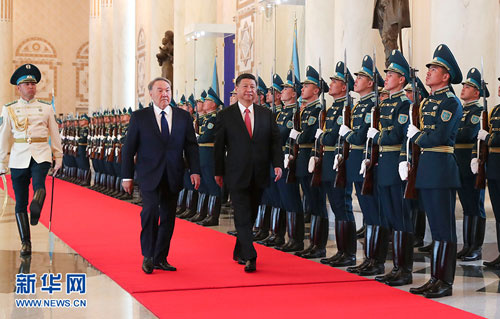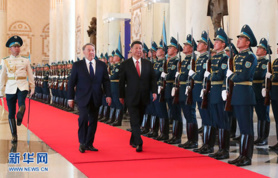By Yang Sheng People’s Daily/Global Times
Chinese President Xi Jinping's visit to Kazakhstan from Wednesday to Saturday will upgrade Sino-Kazakh relations to a new level, and cooperation on the Belt and Road initiative and counterterrorism will be improved, experts said.
Xi left Beijing Wednesday for a state visit to Kazakhstan and the 17th meeting of the Shanghai Cooperation Organization (SCO) Council of Heads of State. Xi was invited by Kazakh President Nursultan Nazarbayev and will also attend the opening ceremony of the World Expo in Astana, the capital of the country, during his stay, the Xinhua News Agency reported.
"It has been four years since Xi launched the Silk Road Economic Belt at Nazarbayev University in Astana, and this year is also the 25th anniversary of diplomatic ties between China and Kazakhstan. Xi's visit will be historic and will upgrade the bilateral relationship to a new level," said Chen Yurong, a senior research fellow on Eastern Europe and Central Asia studies at the China Institute of International Studies.
Cooperation between the two countries has flourished in the past three years and reached an unprecedented high level, covering areas such as energy, infrastructure, trade and environmental protection, amid efforts to integrate China's Belt and Road (B&R) initiative with Kazakhstan's Bright Path Economic Plan, Xinhua reported.
"The Bright Path Economic Plan is Kazakhstan's national development strategy, and the core of the strategy is developing domestic transportation networks to connect the land-locked territory with the outside world and activate domestic growth, so this perfectly accords with the Belt and Road," Chen said.
"Kazakh political and business elites really appreciate China's efforts to boost cooperation, and they are very motivated to deepen ties and seek more opportunities. The two countries have made themselves a community of common destiny and a friendly policy toward China is the country's unshakable national consensus," Chen added.
Kazakhstan was among the first to join China in the B&R initiative. In late 2014, China and Kazakhstan reached a preliminary consensus on industrial capacity cooperation worth more than $14 billion.
In March 2015, the two countries signed 33 deals in this field totaling $23.6 billion, covering steel, non-ferrous metals, sheet glass, oil refining, hydro-power and automobiles, Xinhua reported.
China's oil imports from Kazakhstan via the Sino-Kazakh oil pipeline reached 100 million tons in 2016, approximately equal to half of China's oil production in 2016.
"Kazakhstan's location, in the heart of the Eurasian continent, is strategically significant, and it is also rich in natural resources. The deep cooperation, especially on energy, between the two countries started before the B&R initiative, and now the country is successfully hitching a ride on the fast train of China's rise," Feng Yujun, director of the Institute of Russian Studies at the China Institutes of Contemporary International Relations, told the Global Times on Wednesday.
Counterterrorism cooperation
Security cooperation is also an important part of the Sino-Kazakh relationship, Feng said.
"We have common enemies, terrorism, separatism and religious extremism, which are seriously threatening China, Kazakhstan and also other SCO members' national security."
In recent years, Kazakhstan has faced more serious threats from terrorism, and the main reason is Central Asian jihadists who joined the Islamic State with real combat experience in Syria are returning, Feng said.
A police station in Almaty, Kazakhstan's largest city, was attacked by a terrorist gunman on July 17, 2016, killing four people, including three policemen and one civilian, Xinhua reported. On June 5 in the same year, terrorist attacks in Aktobe, a city in northwest Kazakhstan, killed six people. Police killed 11 suspects and arrested nine others.
Kazakhstan intelligence agencies prevented 12 violent extremist acts in 2016, Sergei Shveikin, deputy chief of the anti-terrorist center of the Kazakh National Security Committee, said on January 31.
The 12 plots were prevented in the early stages of preparation, with 182 people convicted in connection with them, Xinhua reported.
Counterterrorism cooperation between China and Kazakhstan includes intelligence exchanges and joint military exercises, Feng said. "SCO members will also sign an agreement on anti-extremism in the summit, so the cooperation will be deepened."
"Russia is also an important ally of Kazakhstan, and some Russians are still concerned about China's partnership with Kazakhstan. Due to the difficult situation [with its economy and Western sanctions] that Russia is facing, Moscow's capacity is limited. Central Asia's safety and stability is in the common interest of every SCO member, including China and Russia," Feng said.
Xi left Beijing Wednesday for a state visit to Kazakhstan and the 17th meeting of the Shanghai Cooperation Organization (SCO) Council of Heads of State. Xi was invited by Kazakh President Nursultan Nazarbayev and will also attend the opening ceremony of the World Expo in Astana, the capital of the country, during his stay, the Xinhua News Agency reported.
"It has been four years since Xi launched the Silk Road Economic Belt at Nazarbayev University in Astana, and this year is also the 25th anniversary of diplomatic ties between China and Kazakhstan. Xi's visit will be historic and will upgrade the bilateral relationship to a new level," said Chen Yurong, a senior research fellow on Eastern Europe and Central Asia studies at the China Institute of International Studies.
Cooperation between the two countries has flourished in the past three years and reached an unprecedented high level, covering areas such as energy, infrastructure, trade and environmental protection, amid efforts to integrate China's Belt and Road (B&R) initiative with Kazakhstan's Bright Path Economic Plan, Xinhua reported.
"The Bright Path Economic Plan is Kazakhstan's national development strategy, and the core of the strategy is developing domestic transportation networks to connect the land-locked territory with the outside world and activate domestic growth, so this perfectly accords with the Belt and Road," Chen said.
"Kazakh political and business elites really appreciate China's efforts to boost cooperation, and they are very motivated to deepen ties and seek more opportunities. The two countries have made themselves a community of common destiny and a friendly policy toward China is the country's unshakable national consensus," Chen added.
Kazakhstan was among the first to join China in the B&R initiative. In late 2014, China and Kazakhstan reached a preliminary consensus on industrial capacity cooperation worth more than $14 billion.
In March 2015, the two countries signed 33 deals in this field totaling $23.6 billion, covering steel, non-ferrous metals, sheet glass, oil refining, hydro-power and automobiles, Xinhua reported.
China's oil imports from Kazakhstan via the Sino-Kazakh oil pipeline reached 100 million tons in 2016, approximately equal to half of China's oil production in 2016.
"Kazakhstan's location, in the heart of the Eurasian continent, is strategically significant, and it is also rich in natural resources. The deep cooperation, especially on energy, between the two countries started before the B&R initiative, and now the country is successfully hitching a ride on the fast train of China's rise," Feng Yujun, director of the Institute of Russian Studies at the China Institutes of Contemporary International Relations, told the Global Times on Wednesday.
Counterterrorism cooperation
Security cooperation is also an important part of the Sino-Kazakh relationship, Feng said.
"We have common enemies, terrorism, separatism and religious extremism, which are seriously threatening China, Kazakhstan and also other SCO members' national security."
In recent years, Kazakhstan has faced more serious threats from terrorism, and the main reason is Central Asian jihadists who joined the Islamic State with real combat experience in Syria are returning, Feng said.
A police station in Almaty, Kazakhstan's largest city, was attacked by a terrorist gunman on July 17, 2016, killing four people, including three policemen and one civilian, Xinhua reported. On June 5 in the same year, terrorist attacks in Aktobe, a city in northwest Kazakhstan, killed six people. Police killed 11 suspects and arrested nine others.
Kazakhstan intelligence agencies prevented 12 violent extremist acts in 2016, Sergei Shveikin, deputy chief of the anti-terrorist center of the Kazakh National Security Committee, said on January 31.
The 12 plots were prevented in the early stages of preparation, with 182 people convicted in connection with them, Xinhua reported.
Counterterrorism cooperation between China and Kazakhstan includes intelligence exchanges and joint military exercises, Feng said. "SCO members will also sign an agreement on anti-extremism in the summit, so the cooperation will be deepened."
"Russia is also an important ally of Kazakhstan, and some Russians are still concerned about China's partnership with Kazakhstan. Due to the difficult situation [with its economy and Western sanctions] that Russia is facing, Moscow's capacity is limited. Central Asia's safety and stability is in the common interest of every SCO member, including China and Russia," Feng said.
 Menu
Menu
 Xi to upgrade Kazakh ties
Xi to upgrade Kazakh ties

















